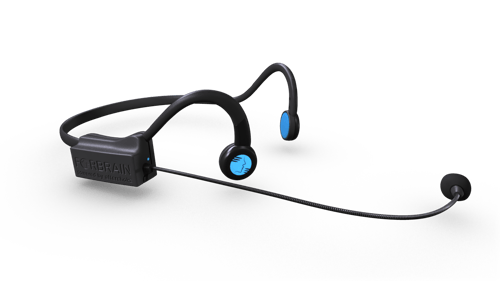Listen up! When hearing loss affects more than hearing, you can use your voice to boost your brain.

Seven reasons why your ears are critical to preserving brain function and how you can use that to your advantage.
The ear and the auditory system consist of an amazing number of nerves and complex neural pathways that support many essential mental functions. When these functions begin to fade and hearing loss becomes evident, many of the cognitive deficits associated with aging appear; decreased focus and attention, poor memory, social isolation, loss of confidence, low energy, others. The auditory system is also implicated in other key functions, like balance and posture, so that continuing to exercise and work at its preservation is crucial for optimal functioning. So, here are 7 reasons why preserving the auditory system is critical—and how you can do it.
1. Hearing is essential for social communication, and social communication is critical for brain preservation. Social interaction uses many cognitive functions like face recognition, attention, empathy, language and speaking skills, and so on. Many neuroscience experts believe that social interaction is at least as critical to preserving cognitive function as gaming or other brain games. When social skills and confidence decrease, people tend to withdraw, which only exacerbates cognitive decline.
2. The ear is involved in both posture and balance, both of which are central to a major concern for seniors—falling. The orientation of one's self in physical space (spatial orientation) contributes to both balance and posture, which are very important for retaining mobility. When mobility declines, isolation is likely to follow.
3. Auditory circuits in the brain are central to sensory processing, keeping people connected to their environment. Sound waves and the auditory system are implicated in the majority of sensory messages we receive. The ability to accurately receive and interpret sensory information is central to staying connected to the environment, and having confidence that you can navigate it.
4. Auditory processing is associated with increased attention and focus, which are critical parts of cognitive function. Often it is poor attention that precedes memory loss. If you can't focus, you can't remember. Maintaining focus and attention are very important to almost all cognitive functions, including memory.
5. Speaking of memory, sensory processing and focus are necessary to imprinting memories, especially via short-term and working memory, which are essential to everyday functioning. Verbal memory is particularly important because most of us think using words, and the use of verbal memory is a critical part of short-term memory.
6. Increased sensory integration and processing elevates many cognitive domains leading to increased energy and mood. This can energize an individual, and even enhance confidence and motivation, which are essential components of healthy aging.
7. The brain is in constant need of challenging, and that includes the billions of cells involved in the auditory network, so working specifically on speaking and listening skills is one way to give the brain a good workout.
So, does all this mean we need to invest in hearing aids to preserve cognitive function? Hearing aids can be helpful in offsetting some auditory problems but there are some other things you can do to keep the auditory system sharp and help to compensate for hearing loss.
One efficient activity is simply using your own voice. Your voice is one of the most powerful ways to activate your auditory system.
First, the sound of your voice is transmitted to your brain by bone conduction. Bone conduction is the natural manner of hearing yourself. Just plug your ears and speak out loud to feel and hear the vibration. It is not only natural but 10 times faster than air conduction (through the ears) and has a much better quality, enhancing the speaker's attention. Have you ever noted that you remember easier what you have said than what you have listened to?
Secondly, your voice is activating a natural process called the auditory feedback loop. This loop gives the nervous system a solid sensory workout by requiring constant feedback for control and adjustments. Even if speaking seems simple for most of us, the fact is that it’s one of the most advanced cognitive tasks humans do. It entails a complex interaction between motor and sensory components, which constantly works the brain.
Thirdly, there’s the subject of posture. Try the following exercises standing up or seated. Make sure that your head is well positioned, as if it is suspended by a wire right from the top. While in this position you can read out loud and for 10 to 20 minutes a day:
- Vary the volume of your voice by continuously going up and down in volume while reading out loud.
- Use your hands to tap the rhythm of words and sentences you are saying, making it like a sing-along, to enhance rhythm and communication.
- Read a full sentence out loud and then try to repeat it from memory to improve verbal memory.
- Repeat this exercise along background music set at a moderate volume. This will enable you to work on selective attention and will favor your ability to extract speech from background noise.
- Read out loud for a few minutes while standing on a balance board. This is a very good exercise to not only strengthen balance, but also to improve your ability to focus on a divided attention cognitive task.
There is now technology available that actually retrains the entire auditory system, keeping it sharp and preserving the critical functions described above.

Forbrain is award-winning technology that trains the brain and auditory circuits. It has been shown to improve sensory processing, attention, memory, reading, and speech and language skills. Using Forbrain is fun and involves speaking or singing into a microphone connected to headphones while sitting up straight—yes, posture is important. There are many ideas for using the headset such as reading poetry or stimulating dialog, pacing the rhythm of speech for memorization, and many others which enhance processing and language skills. The bone conduction headphones allow you to hear your own voice clearly, increasing confidence for speaking and listening.
We recommend that you practice all the exercises mentioned above with the Forbrain in order to maximize benefits.

.png?width=1900&name=blog_banner%20(1).png)


